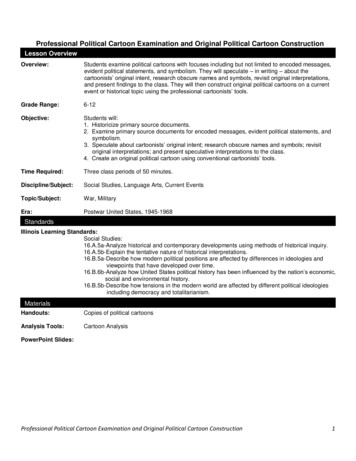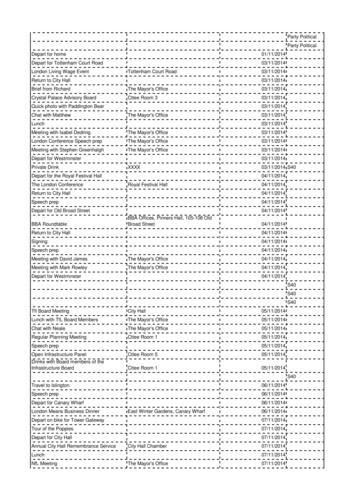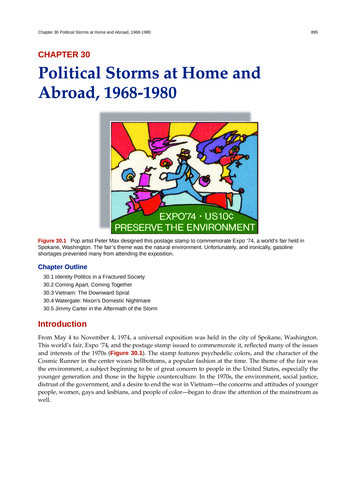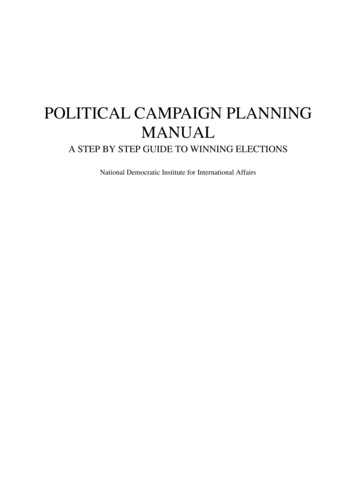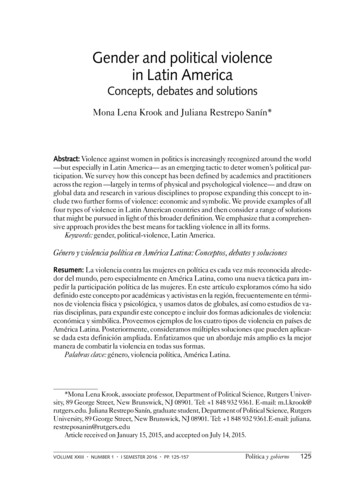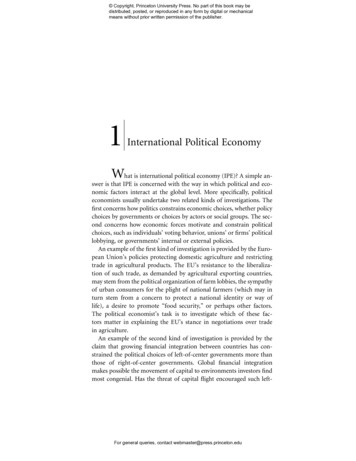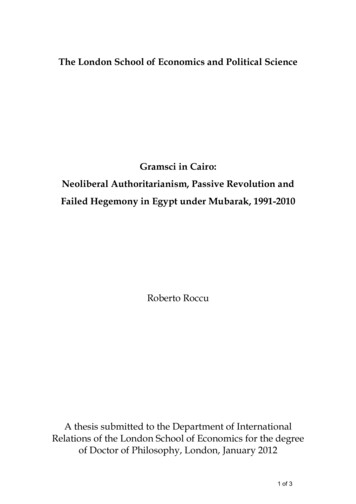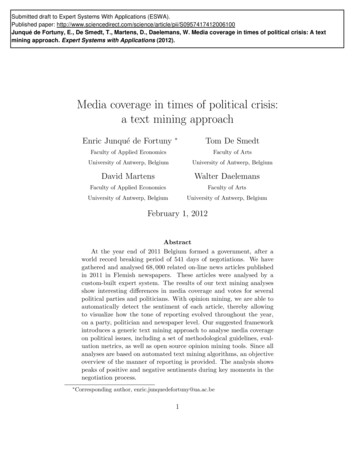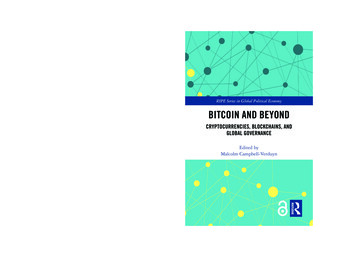
Transcription
16.5 mmRoyal No. 25BITCOIN AND BEYONDEdited by Malcolm Campbell- VerduynRIPE Series in Global Political EconomyBITCOIN AND BEYONDCRYPTOCURRENCIES, BLOCKCHAINS, ANDGLOBAL GOVERNANCEEdited byMalcolm Campbell- VerduynA PDF version of this book is available for free in Open Access at www.taylorfrancis.com. It has beenmade available under a Creative Commons Atrribution-Non Commercial-No Derivatives 4.0 license.an informa businesswww.routledge.com9Routledge titles are available as eBook editions in a range of digital formats780415 792141RoutledgeI S B N 978-0-415-79214-116.5 mm
Bitcoin and BeyondSince the launch of Bitcoin in 2009, several hundred different ‘cryptocurrencies’have been developed and become accepted for a wide variety of transactions inleading online commercial marketplaces and the ‘sharing economy’, as well asby more traditional retailers, manufacturers, and even by charities and politicalparties.Bitcoin and its competitors have also garnered attention for their wildly fluctuating values as well as implication in international money laundering, Ponzischemes and online trade in illicit goods and services across borders. These andother controversies surrounding cryptocurrencies have induced varying governance responses by central banks, government ministries, international organizations, and industry regulators worldwide. Besides formal attempts to ban Bitcoin,there have been multifaceted efforts to incorporate elements of blockchains, thepeer- to-peer technology underlying cryptocurrencies, in the wider exchange,recording, and broadcasting of digital transactions. Blockchains are being mobilized to support and extend an array of governance activities. The novelty andbreadth of growing blockchain- based activities have fuelled both utopian promises and dystopian fears regarding applications of the emergent technology toBitcoin and beyond.This volume brings scholars of anthropology, economics, science and technology studies, and sociology together with global political economy (GPE)scholars in assessing the actual implications posed by Bitcoin and blockchainsfor contemporary global governance. Its interdisciplinary contributions provideacademics, policymakers, industry practitioners, and the general public withmore nuanced understandings of technological change in the changing characterof governance within and across the borders of nation- states.Malcolm Campbell- Verduyn is an SSHRC Postdoctoral Fellow at the BalsillieSchool of International Affairs, Canada.
RIPE Series in Global Political EconomySeries Editors:James Brassett (University of Warwick, UK),Eleni Tsingou (Copenhagen Business School, Denmark)andSusanne Soederberg (Queen’s University, Canada)The RIPE Series published by Routledge is an essential forum for cutting- edgescholarship in international political economy. The series brings together newand established scholars working in critical, cultural, and constructivist politicaleconomy. Books in the RIPE Series typically combine an innovative contribution to theoretical debates with rigorous empirical analysis.The RIPE Series seeks to cultivate: field- defining theoretical advances in international political economy novel treatments of key issue areas, both historical and contemporary, suchas global finance, trade, and production analyses that explore the political economic dimensions of relatively neglected topics, such as the environment, gender relations, and migration accessible work that will inspire advanced undergraduates and graduate students in international political economy.The RIPE Series in Global Political Economy aims to address the needs of students and teachers.For a full list of titles in this series, please visit www.routledge.com/RIPE- Series-in- Global-Political- Economy/book- series/RIPEBeyond Defeat and AusterityDisrupting (the Critical Political Economy of ) Neoliberal EuropeDavid Bailey, Monica Clua- Losada, Nikolai Huke and Olatz Ribera- AlmandozCivil Society and Financial RegulationConsumer Finance Protection and Taxation after the Financial CrisisLisa KastnerBitcoin and BeyondCryptocurrencies, Blockchains, and Global GovernanceEdited by Malcolm Campbell- Verduyn
Bitcoin and BeyondCryptocurrencies, Blockchains, and GlobalGovernanceEdited by Malcolm Campbell- Verduyn
First published 2018by Routledge2 Park Square, Milton Park, Abingdon, Oxon OX14 4RNand by Routledge711 Third Avenue, New York, NY 10017Routledge is an imprint of the Taylor & Francis Group, an informa business 2018 selection and editorial matter, Malcolm Campbell- Verduyn;individual chapters, the contributorsThe right of Malcolm Campbell- Verduyn to be identified as the author ofthe editorial matter, and of the authors for their individual chapters, hasbeen asserted in accordance with sections 77 and 78 of the Copyright,Designs and Patents Act 1988.The Open Access version of this book, available at www.taylorfrancis.com,has been made available under a Creative Commons Attribution-NonCommercial-No Derivatives 4.0 license.Trademark notice: Product or corporate names may be trademarks orregistered trademarks, and are used only for identification and explanationwithout intent to infringe.British Library Cataloguing in Publication DataA catalogue record for this book is available from the British LibraryLibrary of Congress Cataloging in Publication DataA catalog record for this book has been requestedISBN: 978-0-415-79214-1 (hbk)ISBN: 978-1-315-21190-9 (ebk)Typeset in Times New Romanby Wearset Ltd, Boldon, Tyne and Wear
ContentsList of figures List of tables Notes on contributors Acknowledgements 1Introduction: what are blockchains and how are they relevantto governance in the contemporary global political economy? viiviiiixxiii1M alcolm C ampbell - V erd u yn2Moneys at the margins: from political experiment tocashless societies 25M orit z H ü tten and M atthias T hiemann3The internal and external governance of blockchain- basedorganizations: evidence from cryptocurrencies 48Y ing - Y ing H sieh , J ean - P hilippe ( J P ) V ergne ,and S ha W ang4The mutual constitution of technology and globalgovernance: Bitcoin, blockchains, and the internationalanti- money-laundering regime 69M alcolm C ampbell - V erd u yn and M arcel G og u en5Between liberalization and prohibition: prudent enthusiasmand the governance of Bitcoin/blockchain technology 88K ai J ia and F alin Zhang6Cryptocurrencies and digital payment rails in networkedglobal governance: perspectives on inclusion and innovation D aivi R odima - T aylor and W illiam W . G rimes109
vi Contents7Governing what wasn’t meant to be governed: acontroversy- based approach to the study of Bitcoingovernance 133F rancesca M u siani , A lexandre M allard , andC é cile M é adel8Experiments in algorithmic governance: a history andethnography of “The DAO,” a failed decentralizedautonomous organization 157Q u inn D u P ont9Conclusion: towards a block age or blockages of globalgovernance? 178M alcolm C ampbell - V erd u ynIndex 198
Figures3.14.15.15.29.1Variation of the five cryptocurrencies in our sample along thedecentralization spectrum The mutually constitutive relationship between technologiesand international regimes Spectrum of Bitcoin/blockchain governance Bitcoin price fluctuations, 2009–17 (US dollars) Interrelationships between governance by, with, and ofblockchains 58719194186
Tables2.13.13.25.1Evolution of the Bitcoin money game List of variables Regression results Key events and policies in China 416263102
ContributorsMalcolm Campbell- Verduyn is an SSHRC postdoctoral fellow at the BalsillieSchool of International Affairs. His research combines a general focus on language and ideas in the global political economy, with a specific interest in theroles of private actors, technologies, and technical artefacts in contemporaryglobal governance. His research has appeared in the journals Business andPolitics, Competition and Change, Global Society, Journal of EuropeanPublic Policy, New Political Economy, and New Political Science. He is theauthor of Professional Authority after the Global Financial Crisis, publishedin 2017 by Palgrave Macmillan.Quinn DuPont is a postdoctoral researcher at the University of Washington. Hestudies human and social dimensions of cybersecurity, cryptography, andcode. He has a PhD in information science (Toronto), and is an ALA- accredited librarian (Western), with a decade of industry experience as asenior information specialist at IBM, an IT consultant, and a usability andexperience designer. He is currently writing a book on cryptocurrencies andblockchains (Polity).Marcel Goguen is a PhD candidate in political science at McMaster University,Hamilton, Canada. He studied political science at l’Université de Monctonand the University of Ottawa. His research focuses on the interstice betweeninternational relations theory, political theory, and global finance. Under thesupervision of Tony Porter, he is participating in research funded by theSocial Sciences and Humanities Research Council of Canada (SSHRC) on‘Numbers in the changing fabric of global governance’.William W. Grimes is Associate Dean for Academic Affairs and Professor ofInternational Relations and Political Science at the Frederick S. PardeeSchool of Global Studies at Boston University. He is the author of Unmaking the Japanese Miracle: Macroeconomic Politics, 1985–2000 (CornellUniversity Press, 2001) and Currency and Contest in East Asia: The GreatPower Politics of Financial Regionalism (Cornell University Press, 2009).He has published extensively on financial policy and the political economyof East Asia.
x ContributorsYing- Ying Hsieh is a PhD candidate at Ivey Business School (Canada). Havingreceived her education and worked in the technology sector, Ying- Ying isdeeply interested in the overarching theme of innovation. Her research setsout to explore how technologies enable novel organizational design, which inturn enables new forms of organizing. Specifically, she focuses on coordination and governance in the cryptocurrency and fintech industries. Ultimately,she aspires to theory- building for mechanisms by which organizations inthese sectors create and capture value to achieve superior performance.Moritz Hütten is a graduate student of financial and economic sociology atGoethe University Frankfurt. His research interests include cryptocurrencies,banking regulation in Europe, and financial literacy. He has been involved inseveral research projects at Goethe University Frankfurt and Darmstadt Business School, as well as the research centre Sustainable Architecture forFinance in Europe (SAFE).Kai Jia is an assistant professor in the School of Political Science and PublicAdministration, University of Electronic Science and Technology of China,Chengdu, China. Kai Jia completed his doctorate at the School of PublicPolicy and Management in Tsinghua University, Beijing. He has been a Fulbright Scholar, a visiting scholar at the University of California at Davis. Hehas extensive research experience in internet and data governance. Hisresearch topics include the internet platform economy and its regulations,individual production models and value distribution studies, the Bitcoin openresource community and its governance, sovereign data and privacy. He hasseveral publications in the FTChinese and 21st Century Business Herald.Alexandre Mallard is Director of the Centre de Sociologie de l’Innovation atMINES ParisTech, PSL Research University. Originally trained as a sociologist of science and technology, he now works in the field of economic sociology. He has conducted research on sales activity, on very small businesses,and on the rise of network interactions in the corporate environment. Hiscurrent research projects investigate the social inscription of innovation, atthe crossroads between economic sociology and political science.Cécile Méadel is a sociologist, professor at the Department of Communication(Institut français de Presse- IFP) of Pantheon Assas University in Paris, andassociate researcher at the Center for the Sociology of Innovation. Her workfocuses on the uses and users of communication technologies, investigatingthe mutual adjustment between a means of communication, the professionalsspecialized in it, its resources, and its users. Her most recent work is on internet regulation of e- communities and on industrial making of audiences(through audience measurement tools or devices for internet users’contributions).Francesca Musiani (PhD, MINES ParisTech, 2012) is an associate researchprofessor (chargée de recherche), French National Centre for Scientific
Contributors xiResearch (CNRS), Institute for Communication Sciences (ISCC- CNRS/Paris- Sorbonne/UPMC), associate researcher at the Centre for the Sociology ofInnovation of MINES ParisTech- PSL, and academic editor for the InternetPolicy Review. Her research explores internet governance ‘by infrastructure’,and draws upon an interdisciplinary training in information and communication sciences, science and technology studies, and international law. Francesca is the author of Internet et vie privée [Internet and Privacy] (UpprEditions, 2016) and Nains sans géants. Architecture décentralisée et servicesInternet [Dwarfs Without Giants. Decentralized Architecture and InternetServices] (Presses des Mines, 2013 [2015], Prix Informatique et Libertés2013 of the French Privacy and Data Protection Commission, CNIL).Daivi Rodima- Taylor is a lecturer and research associate at the Frederick S.Pardee School of Global Studies of Boston University. She is a social anthropologist and Africanist, with a doctorate from Brandeis University. Herresearch focuses on fiduciary culture and financial inclusion, diaspora andmigration, informal economies, land and natural resource tenure, and innovation and entrepreneurship. Dr Rodima- Taylor has taught sustainable development and anthropology, and contributed to international development work infinancial inclusion, participatory planning, and community governance. Shehas conducted longitudinal ethnographic research in Africa and published inacademic and policy- oriented journals.Matthias Thiemann is an assistant professor of European public policy at Sciences Po, Paris. His research investigates the patterns of interaction of publicand private actors in the financial system post- crisis in terms of the development as well as the enforcement of regulation or the intervention of stateactors directly in financial markets. His work has appeared in the journalsAmer ican Journal of Sociology, Review of International Political Economy,Business and Politics, and Competition and Change, among others.Jean- Philippe (JP) Vergne is an associate professor at Ivey Business School(Canada) who examines how socially contested and/or illegal organizationsaffect the birth, death, and renewal of industries operating at the vanguard ofcapitalism. JP is the founding coordinator of the Crypto Capitalism Centerand co- director of the Scotiabank Digital Banking Lab, where he coordinatesa research programme on fintech. In 2013, JP co- authored the book ThePirate Organization: Lessons from the Fringes of Capitalism (Harvard Publishing), and in 2017 the graphic novel Déjà Vu, whose chapters can be foundrecorded in the bitcoin blockchain.Sha Wang is a PhD candidate in economics at Western University (Canada).Her research area focuses on the new trends in financial markets and theirimpact on asset returns. She has co- authored with Professor JP Vergne ondrivers of cryptocurrency returns. Her PhD thesis studies the impact of speculative activities on major currencies’ exchange rate fluctuations. She has benefited from her industry experience in the currency hedging arm of an
xii Contributorsinvestment institution to incorporate additional insight into her theoreticalframework on currency values.Falin Zhang earned his PhD in International Relations from McMaster University (Hamilton, Canada) in 2015 and is now a postdoctoral research fellow atthe School of International Studies, Peking University (Beijing, China). Hisprincipal research interests lie in international relations, international politicaleconomy, global financial governance, foreign policy analysis, and Chinesepolitics. His recent research focuses on China’s foreign policy in global financial governance and recent works include journal articles published, respectively, in the Journal of Contemporary China (‘Holism Failure: China’sInconsistent Stances and Consistent Interests in Global Financial Governance’, 2016) and the Journal of International Relations and Development(‘The Chinese Developmental State: Standard Accounts and New Characteristics’, 2017), a book chapter, ‘Determinants and Fluctuations of China’sExchange Rate Policy’, in The Political Economy of Chinese Finance (editedby J. Jay Choi et al., Emerald, 2016), and a translated Chinese textbook,Global Political Economy (Robert O’Brien and Marc Williams, 2016).
AcknowledgementsThe support of John Ravenhill and the Balsillie School of International Affairsas well as the Social Sciences and Humanities Research Council of Canada(grant no. 611-2016-0318) is gratefully acknowledged for having enabled fruitful discussions of this research in Waterloo, Canada at the end of February 2017.Sincere thanks are also due to Eleni Tsingou and Eric Helleiner for providingcontinuous support from the inception to the final production of this volume.
1IntroductionWhat are blockchains and how arethey relevant to governance in theglobal political economy?Malcolm Campbell- VerduynImagine having almost instantaneous access to a permanent record of all digitaltransactions undertaken across the world. Without revealing precisely who andwhat is involved in these transactions, this digital database grants you nearlyreal- time overviews of peer- to-peer exchange within and across national borders.Such unprecedented capacity to monitor direct Internet- based interactionbetween quasi- anonymous individuals who undertake, verify, and publishrecords of their digital transactions is at the core of promises and fears surrounding blockchains. This volume explores governance implications for the actorsand processes involved in ordering, managing, and organising an increasinglydigital global political economy arising from growing applications of this set ofemergent technologies to Bitcoin and beyond.At their essence, blockchains are digital sequences of numbers coded intocomputer software that permit the secure exchange, recording, and broadcastingof transactions between individual users operating anywhere in the world withInternet access. Like most technological changes, the development of blockchains drew on and combined several existing technologies. Blockchains incorporate digital encryption technologies that mask, to varying degrees, the specificcontent exchanged as well as the identities of individual users. Algorithms, pre- coded series of step- by-step instructions, are also mobilised in solving complexmathematical equations and arriving at a consensus on the validity of transactions within networks of users. Time- stamping technologies then periodicallybundle verified transactions into datasets, or ‘blocks’. Linked together sequentially, these ‘blocks’ form ‘chains’ that make up larger ‘blockchain’ databases oftransactions that broadcast a permanent record of transactions whilst maintainingthe anonymity of users and specific content exchanged. Blockchains are intendedto be maintained by all users in manners meant to be immutable, unless usersarrive at a clear consensus to undertake changes.Ledgers of user- verified transactions were envisioned by the science fictionwriter H.G. Wells (2005) in the 1930s and advocated by ‘cypherpunk’ computerhackers seeking to ensure digital privacy as the Internet began evolving later inthe twentieth century (Jeong, 2013). The technical blueprint for developingblockchain technology was originally proposed in a white paper published byone Satoshi Nakamoto in 2008. Efforts to identify this individual or group of
2 M. Campbell-Verduynindividuals have remained unsuccessful, adding a substantial aura of mystery tothis information communication technology (ICT).1 The technical design forblockchains initially circulated on the cryptography mailing list was quicklytaken up by an online community of technology enthusiasts, who developedBitcoin as the first time- stamped ledger of user- verified transactions in 2009. Initially intended to enable the transactions of monetary- like ‘coins’ between users,the Bitcoin blockchain was later adapted for the digital exchange, verification,and broadcasting of a range of other information. As non- proprietary and open- source software, the original Bitcoin ‘protocol’ was replicated in developingother blockchains that exchange not only ‘cryptocurrencies’ (CCs), but also amuch wider range of information on everything from ownership rights and contractual obligations to votes and citizenship.Applications of blockchain technologies began being noticed beyond technologists and technology enthusiasts a half- decade following the publication ofthe 2008 white paper. Attention to Bitcoin in particular exploded in 2013because of a confluence of events internal and external to esoteric online ‘crypto communities’. Internally, the rise and fall of both the leading ‘exchange’ converting CCs to and from state- backed currencies, Tokyo- based Mt. Gox, as wellas the infamous online marketplace for illicit goods and services, the Silk Road,received widespread media coverage. Primarily negative and sensationalistic,this attention alerted citizens, firms, and governments to what appeared as the‘new wild west’ surrounding Bitcoin (Singh, 2015). At the same time, a host ofexternal events focused more positive attention to the potential benefits of theoriginal application of blockchain technologies as alternatives to the widespreadgovernment and corporate surveillance revealed in the Edward Snowden leaks;financial instabilities in the eurozone that included the confiscation of deposits inthe ‘bailout’ of Cypriot banks; technical glitches at major banks that left customers unable to access their savings; and confirmation that controversial centralbank quantitative easing programmes would be extended well beyond their original intention as emergency responses to the 2007–08 global financial crisis.Whether for philosophical, speculative, or security reasons, wider public interestin the promises and perils of Bitcoin occurred in a period of unprecedented volatility in the exchange values of the original CC, which rose nearly tenfold fromjust over US 10, only to fall by nearly half and eventually end 2013 at aroundUS 750.In the wake of this pivotal year, Bitcoin and blockchain technologies becameincreasingly integrated into the very global economic system that their earliestdevelopers had explicitly sought to provide alternatives to. Bitcoin became progressively accepted for a wide variety of transactions in leading online commercialmarketplaces, such as eBay, in the ‘sharing economy’ of AirBnB and Uber, as wellas by more traditional retailers, manufacturers, and even by some political parties.Beyond merely accepting Bitcoin for transactions, some multinational firms begandeveloping their own CCs and integrating blockchains into their operations. Theworld’s largest retailer, Wal- Mart, trialled the technology for enhancing qualitycontrol over its global food supply chain. Several investment banks and stock
Introduction 3market operators also began integrating blockchains in efforts to streamline theirback- office operations. Even some governments began developing blockchain- based land and health registries as well as benefits payments systems. A widervariety of applications2 beyond the esoteric online communities and illicit marketplaces in which the technology had originally been applied heralded the growingintegration of blockchains into key segments of the global political economy.While surveys nearly continually hint at ever- greater roles and applications ofblockchains (e.g. World Economic Forum, 2015: 24), even traditionally enthusiastic consultants have begun to consider whether ‘peak hype’ has been reachedin the excitement this technology has generated (Gartner, 2016). Leading media,such as The Economist (2015), stress the ‘extraordinary potential’ of the blockchain ‘as a piece of innovation on a par with the introduction of limited liabilityfor corporations, or private property rights, or the internet itself ’. Scholars havecharacterised blockchains as ‘the most important innovation in fundamentalarchitecture since the tubes of the internet were first developed’ (LawrenceLessig, cited in Eyers, 2015). The first book dedicated to blockchains comparesthe technology to the Magna Carta and the Rosetta Stone, providing ‘the potential for reconfiguring all human activity’ (Swan, 2015: viii).Further context and nuance is clearly necessary for evaluating the widersocio- economic implications of blockchains in a global political economy that ismore interconnected than ever before as a result of the increasing spread andapplication of these and other Internet- based technologies. In specificallyaddressing the implications posed by blockchains for governance in the contemporary global political economy, this book provides wider insights into thechanging character and role of emergent technologies in organising, ordering,and managing the increasingly instantaneous and multifaceted relationshipsbetween actors and processes within and beyond the borders of nation- states.Implications for, and insights into, contemporary globalgovernanceHow does examining a relatively esoteric set of emergent technologies yielduseful insights into the character of contemporary global governance? Journalists and technology enthusiasts regularly hint at how applications of blockchainshave been transforming key facets of twenty- first-century global governance.Gillian Tett (2014) at the Financial Times, for instance, has emphasised howblockchains shift trust from traditional centralised institutions towards decentralised users interacting directly through digital cryptography and computer code.Technologists, meanwhile, celebrate how blockchains foster nearly instantaneous exchange to occur amongst individuals that bypasses a range of intermediaries and centralised ‘trust actors’, governments in particular (e.g. Cox, 2013;Brito et al., 2015; Koenig, 2015). Rather one- sided praise of such curtailment ofcentralised authority, along with journalistic assessments hampered by formatsmore conducive to sensationalistic claims than nuanced analysis, provide some,albeit limited, insight into the changing character of twenty- first-century global
4 M. Campbell-Verduyngovernance (e.g. Kaminska, 2015; Soltas, 2013; Rifkind, 2013; Vigna andCasey, 2015; for an exception see Popper, 2015).Scholarly treatments of Bitcoin, CCs, and blockchains began to emerge in2011. With some exceptions, early studies have remained technical and narrowlyfocused, largely avoiding consideration of the wider implications that blockchainapplications pose for contemporary global governance.3 Legal scholarship detailing the varied manners in which Bitcoin, CCs and blockchains fit within existingformal laws and regulations often loses sight of the wider governance implications presented (Bollen, 2013; Farmer, 2014; Hughes and Middlebrook, 2014;Penrose, 2013; Kiviat, 2015; Pflaum and Hateley, 2013; Ponsford, 2015). Studiesby computer scientists focused on the technical properties of blockchains arelargely concerned with testing the immutability and pseudo- anonymity of blockchain applications (Arvind et al., 2016; Böhme et al., 2014; Yli- Huumo et al.,2016). Economists, the most prominent public commentators on CCs and blockchain technologies (Foley, 2015), largely contemplate whether or not CCs canbe considered as currencies or central elements of the so- called ‘Internet ofMoney’ (Wladawsky- Berger, 2014; e.g. Dwyer, 2015; Lo and Wang, 2014;Selgin, 2015; Weber, 2016).4While pioneering in their analysis of complex technological developments,initial scholarly studies tend to be economistic, legalistic, and technical inmanners that overlook, or merely hint at, wider considerations for global governance in the ‘digital age’ (Der Derian, 2003). Key questions of governance oftenremain unaddressed in this literature, such as how and where exactly are decisions made and discontent voiced in blockchain- based activities? Do blockchainsovercome the flaws of existing decision- making processes? Do blockchains giverise to new governance problems and pathologies? Is ‘blockchain- based governance’ desirable for all actors in the global political economy?Social scientists, and scholars of global political economy (GPE) in particular,have long addressed questions more generally pertaining to the nexus of technology and global governance, and in regards to ICTs in particular (Singh andRosenau, 2002; see also Ruggie, 1975; Talalay and Farrands, 1997; Porter,2002). The turn of the millennium technology stock bubble and rise of Internettechnologies were analysed in nuanced debates, such as over the opportunitiesand threats presented for traditional forms of monetary governance posed byelectronic moneys (Cohen, 2001; Helleiner, 1998; Kobrin, 1997). More widely,GPE studies provide a range of insights on key questions of agency, ethics, legitimacy, and power arising from applications of novel technologies. For example,scholarship on ‘digital gaps’ draws attention to how technology- enableddecision- making can become dominated by specialists and exclude those lessfamiliar or less able to remain appraised with intricate sets of technologies(Wade, 2002; Youngs, 2007). New and emergent tech
Books in the RIPE Series typically combine an innovative contribu-tion to theoretical debates with rigorous empirical analysis. . ation and governance in the cryptocurrency and fintechindustries. Ultimately, she aspires to theory-building for mechanisms by which organizations in these

